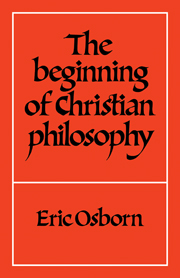Book contents
- Frontmatter
- Contents
- PREFACE
- REFERENCES
- ABBREVIATIONS
- 1 CHRISTIAN ARGUMENT
- 2 PEOPLE AND PLACES
- 3 THE GOD ABOVE
- 4 THE RATIONAL LAUGHING ANIMAL
- 5 COSMOS AND CREATION
- 6 HISTORY
- 7 THE SHORT WORD
- CONCLUSION
- APPENDIX
- BIBLIOGRAPHY
- INDEX OF BIBLICAL CITATIONS
- INDEX OF CITATIONS FROM ANCIENT AUTHORS
- INDEX OF CITATIONS FROM MODERN AUTHORS
- GENERAL INDEX
- Frontmatter
- Contents
- PREFACE
- REFERENCES
- ABBREVIATIONS
- 1 CHRISTIAN ARGUMENT
- 2 PEOPLE AND PLACES
- 3 THE GOD ABOVE
- 4 THE RATIONAL LAUGHING ANIMAL
- 5 COSMOS AND CREATION
- 6 HISTORY
- 7 THE SHORT WORD
- CONCLUSION
- APPENDIX
- BIBLIOGRAPHY
- INDEX OF BIBLICAL CITATIONS
- INDEX OF CITATIONS FROM ANCIENT AUTHORS
- INDEX OF CITATIONS FROM MODERN AUTHORS
- GENERAL INDEX
Summary
Each group of problems has shown two marked characteristics. In the first place there has been the untidiness of infinity, for there has never been a point at which the questions could be rounded off and completed. There was always a sense of being on the edge of the desert, or the shore of the sea. (The chief reason for stopping was that the topic was inexhaustible; enough had been seen to learn that the end would never be in sight.) The God above was shrouded in mystery or revealed in brightness too fierce for man to bear. Man, as God's image yet sinful, as free yet captive, was a rational, laughing animal who found life through the practice of death. The world, God's good cosmos, was shot through with suffering and evil. History had reached its end in Christ, but still went on in eerie confusion; another end remained but when, why or how could not be set down.
In the second place, there has been one conclusion and that a short one, to each investigation. The unknown God is known through his Word. Man is logikos and he learns his true nature only in the perfect man and complete Logos. The world is made and governed by the divine Word. History is long but it is summed up in the Word. The brutal brevity and simplicity of the gospel was unattractive to most people: only a slave mind could accept such a reduction of so many issues.
- Type
- Chapter
- Information
- The Beginning of Christian Philosophy , pp. 206 - 257Publisher: Cambridge University PressPrint publication year: 1981



